The Book of Belonging
Why this children's Bible may be the perfect companion in your spiritual wanderings
Note from Brian: Today, we have a guest post from my friends Mariko Clark and Rachel Eleanor. I can’t wait for you to hear about their incredible project— they wrote this Bible for kids, but if you’re anything like me, you’re going to love it for yourself. Learn more below, and pick up your copy here!
Hi we’re Mariko and Rachel, the author and illustrator of The Book of Belonging. Two spicy gals on our own journeys of spiritual untangling. This led us to create The BoB, a story bible for kind and contemplative kids (and their grown-ups). Since the book came out last week, we have been hearing overwhelmingly from adults who have purchased the book for a child and kept it for themselves because they found it very healing. We know Brian is also carving out a corner of the internet for adults who are looking to heal. Having sat in that corner ourselves, we’re aware that there’s a vetting process involved in the sort of spiritual resources you consume, so we’re sharing a bit about The BoB with you today. Let’s get into it!
For this audience, we thought it might be more helpful to do a rapid-fire vetting of some issues we know many of us feel tender about:
Are there exclusively male pronouns for God? yes/no
No pronouns at all! Just God :) although we explore gendered Biblical analogies for God (good father, mother hen, shepherd, birthing mother, etc)
Is there mention of eternal conscious torment? yes/no
Hard nope. I tried to leave mention of the afterlife expansive enough that parents can choose what to teach. But I tip my hand a bit with universalist reconciliation in the final story.
Is there theology of penal substitutionary atonement? (God wanted to kill you because of sin but instead he killed Jesus) yes/no
No! We leave room for a lot of atonement theories, but not that one!
Do the stories have a moral lesson or a hero character? yes/no
No, the focus of every story is what can we learn about God from this story and who does God say we are?
Is there diversity in the illustrations? yes/no
Yes! Bodies of all sizes, colors, abilities, ages, genders. Nursing bodies! Pregnant bodies! Brown Jesus and angels that aren’t blonde!
Is the full range of human emotion honored? yes/no
Yes! Many of the stories reference grief, anger, frustration, fear, longing, envy and they aren’t cast in terms of good/bad. We have one Wonder Moment discussion about how anger can feel uncomfortable, but also points to what we care about, and can help move us to action. We talk about how grief can look different for different people (feeling busy and angry like Martha or falling apart like Mary) and how both are valid. We also work to show Jesus experience human emotion as well. *include some pictures*
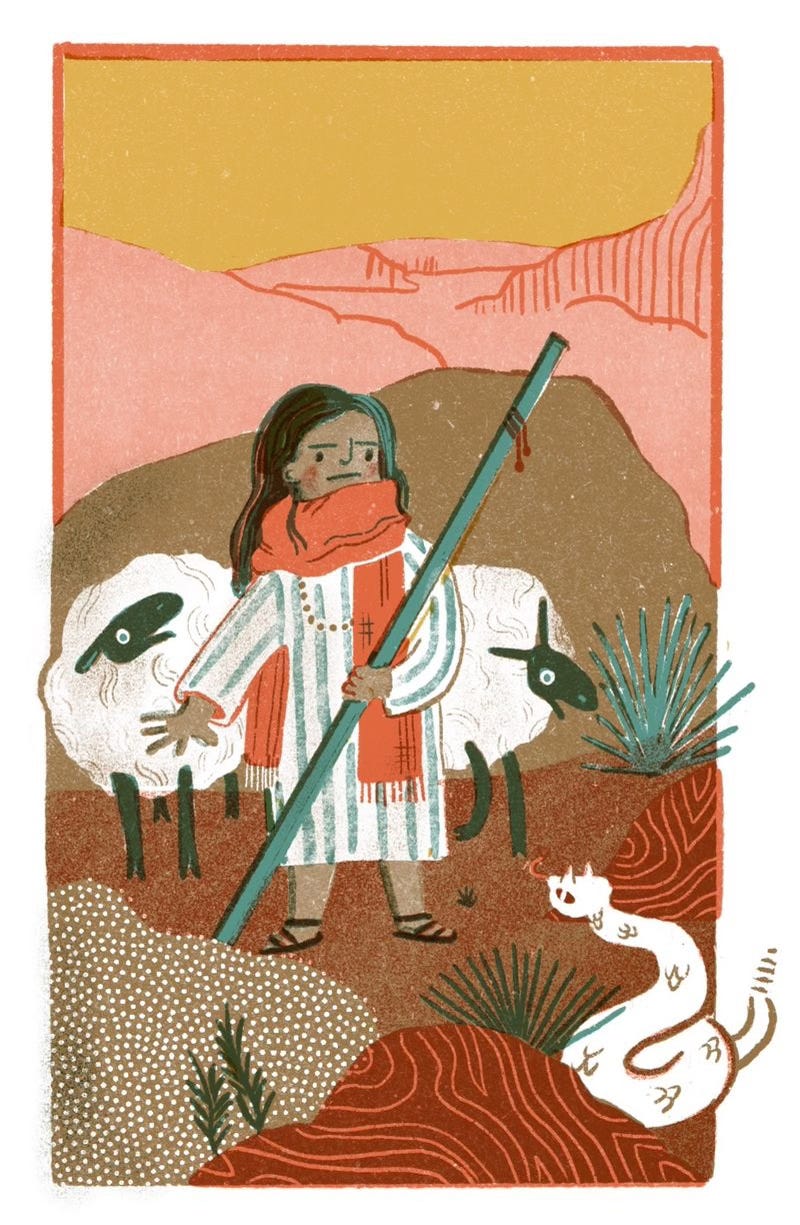
Does it include women? Yes/no
Yes! Over half of our stories have main female character, 80% feature a woman and 62% of the pages have a woman depicted in the illustration (that number would be higher but we have a LOT of animals too, haha.) You’ll find some of the old favorites (Hannah, Esther, Mary) but some you’re probably less familiar with (Huldah, Noah + sisters, Rhoda, etc)
Is there glorification of violence? yes/no
No! Of course some of the stories are inherently violent, but we worked with an early childhood education expert to keep the details age-appropriate and eliminated stories that can’t be well-explained until kids can grasp nuance (Example: Noah’s ark, death of the firstborn plague) There were moments when violence is inherent to a story, but we didn’t go into grisly detail. Rachel sometimes incorporated symbols and iconography to allude to violent aspects of a story (the story of Hagar, the crucifixion), allowing parents to reference those simplified images and judge for themselves how much detail they’d like to delve into with their kids. We didn’t want to completely erase the fact that violence occurred and was often central to these stories. We just wanted to give parents the levers to decide to what degree they’d engage with that violence with their kids.
What does Jesus have to do with belonging?
Everything! What I see repeatedly throughout the life, ministry and death of Jesus is an insistence on belonging. He seeks out the folks that have been excluded. He pushes back against corrupt religious elites who want to commodify belonging. He challenges exclusionary practices and dogma. He is in the business of belonging and thats a lens that we applied to every story.
How does The Book of Belonging tackle the topic of sin?
Well, if you were to ask the people leaving us one star reviews, they would say that it doesn’t!
But I think that speaks to a bigger trend in Christian parenting, where we were taught to work backward from a fear of hell, sort of like this twisted version of If You Give a Mouse a Cookie.
If you don’t want your kid to burn forever, you need to get them to say a specific prayer. If you want them to say a specific prayer, you need to convince them they need Jesus. If you want to convince them they need Jesus, you need to make them aware of their sin. If you want to make them aware of their sin, it needs to be the focus of any parenting or discipline and certainly the focus of any spiritual practice. Really hammer home how they’re totally depraved.
But the problem with that kind of storytelling is that it starts in Genesis 3 (often referred to as “The Fall”...despite that word never being used in that chapter…) and it leaves no room for the fact that often with kids, they’re not “rebelling”, but simply developing at a normal pace.
But with BoB, we start with Genesis 1 - when God creates humans and calls them “very good”.
And then after we talk about Genesis 3, we explore the many different Hebrew words for sin. Our Hebrew language advisor helped us with this one. Because Hebrew is a language rooted in pictographs, it makes for some really lovely metaphors. So sin can mean anything from “travelers who wandered off of their footpath” to “a tree that grew twisted in a harsh environment” to “an arrow that missed its mark”, which makes for some great discussion. We also later explore sin as systemic or community failure to love.
When you start with goodness and end with reconciliation, you end up with stories in the middle of normal people, stumbling in countless ways toward reconciliation with a God who never stops saying “you belong with me”. And that’s actually good and accessible news for kids. When they inevitably screw up, it takes them from unhealthy shame (I am wrong) to healthy guilt (I did something wrong). And that’s something we can work and grow with!
Why is The Book of Belonging a good fit for deconstructing parents or adults?
Rachel: As a deconstructed Christian myself, I can give this book the big ol’ thumbs up. For many years, engaging with the Bible was just way too triggering for me. Marri approached me regarding this project just as I was starting to feel a craving to re-engage with these stories, but in a new way. Maybe you’re feeling that way, too. Getting to be a part of the telling, rather than being a passive receiver of specific theological concepts was very healing. I got to do that as an illustrator, but you get to do that as a reader, as well. The Book of Belonging is set up so that readers are more active participants with the text. If you’re deconstructing, I think the storytelling and built-in moments to engage with questioning and contemplative practice will be very supportive of that messy gray space you might be inhabiting. I hope it will be healing for adults like me, and for their kiddos…we worked hard to make a book that encourages wonder, mystery, and nondualism… and wouldn’t lead to the sort of traumatic fallout may of experience when we began questioning are sacred texts.
Mariko: While I was certainly writing with that perspective in mind, I think I would have been hesitant to label it that way before this past week. But the DMs don’t lie - nearly every message I receive is from someone who is in a very messy spiritual space and is happy-sobbing their way through the first few chapters. There’s been lots of happy crying in my corner of the internet and I would say we’ve officially earned that title: Good Fit for Deconstructing Parents and Adults.
What’s your deal, like, spiritually?
Mariko: I grew up fundamentalist and despite having long-since deconstructed much of that, I am still deeply skittish around certainty. Like so many of the people we hear from, I wasn’t allowed to ask questions or have doubts. It made for a small and somewhat brittle concept of God. I want something different for my kids and I think that means carving out space for mystery. I think it means admitting to them that not only do I not know the answer to all of their questions…but sometimes, there is no answer. (Or even more complicated - there are multiple answers.)
It feels important to provide the caveat that my deconstruction process differs from a lot of my peers. In many ways, it felt like fundamentalism rejected me before I could reject it. A spicy, opinionated, incessantly curious girl? There wasn’t room for me or for the God I knew and loved deeply from my own personal encounters. Learning that there were more expansive theologies out there…that felt correct and joyful. Many of my friends who have deconstructed evangelicalism have had more of a grief process and I want to be sure to honor that. Church was cozy and affirming for them in a way I can’t relate to. However, I think that has prepared me for this process in a strange, Slumdog Millionaire way.
Rachel: I don’t really call myself a Christian anymore. I grew up evangelical and have always been deeply involved in church. Bible studies, retreats, leadership, the works. After a years-long process of deconstruction, I eventually left. It came down to my church’s policy against LGBTQ+ inclusion, “Welcoming, but not affirming.” That led to a lot of grief, and I took a long break from the Bible. But this project has given me hope and healing around these stories and made them safe to engage with again. Getting to reinterpret these stories was incredibly healing and opened new perspectives on other areas of my life. Switching from reading these stories for my “quiet time” and asking myself “what am I supposed to get out of this text? Or “what is God trying to tell me?” to “I wonder what this character is thinking and feeling?” was so transformative. I’d say I definitely took the path of Ignatian spiritual practice with this one, and it breathed so much new love and life into these stories.
Where I’ve landed for now is that these stories are part of my “mother tongue.” It’s like, this system of characters, concepts and symbols were my first language. I went through a time where I was traumatized and hurt by people speaking that language and so I began learning a new one, and meeting new people who speak that language was so helpful and healing. But Christianity is still the tradition that I grew up in, it was my first language, and although leaving the faith entirely is the right decision for many people, and it was for me for a time, after a while I began muttering to myself again in that mother tongue. Now, I get to take on the role of storyteller…and I think having an outsider perspective has lent depth to my storytelling and empathy and a sense of psychological safety for others who might feel like outsiders. Like, you don’t have to sign on the dotted line and agree to a whole system of beliefs to get something out of these stories, and I never felt permission to do that before.
Tell us about some of the research, theological perspectives, and other scholarship that influenced the making of the book:
We had a panel of advisors who read every word of this manuscript, including scholars in the field of: womanist theology, ancient near eastern languages, feminist theology, new testament theology, queer theology and disability theology. And believe us, they did not pull any punches! They made Mariko cry at least three times - but we believe the book (and Christianity in general!) is richer and more expansive because of their input.
Thanks for having us! It’s always a treat talking to other wanderers. You’re not alone. If you’re interested in learning more about The Book of Belonging, you can check out our website and substack, or purchase a copy for yourself wherever books are sold.


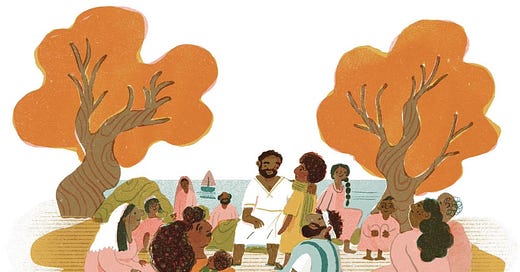


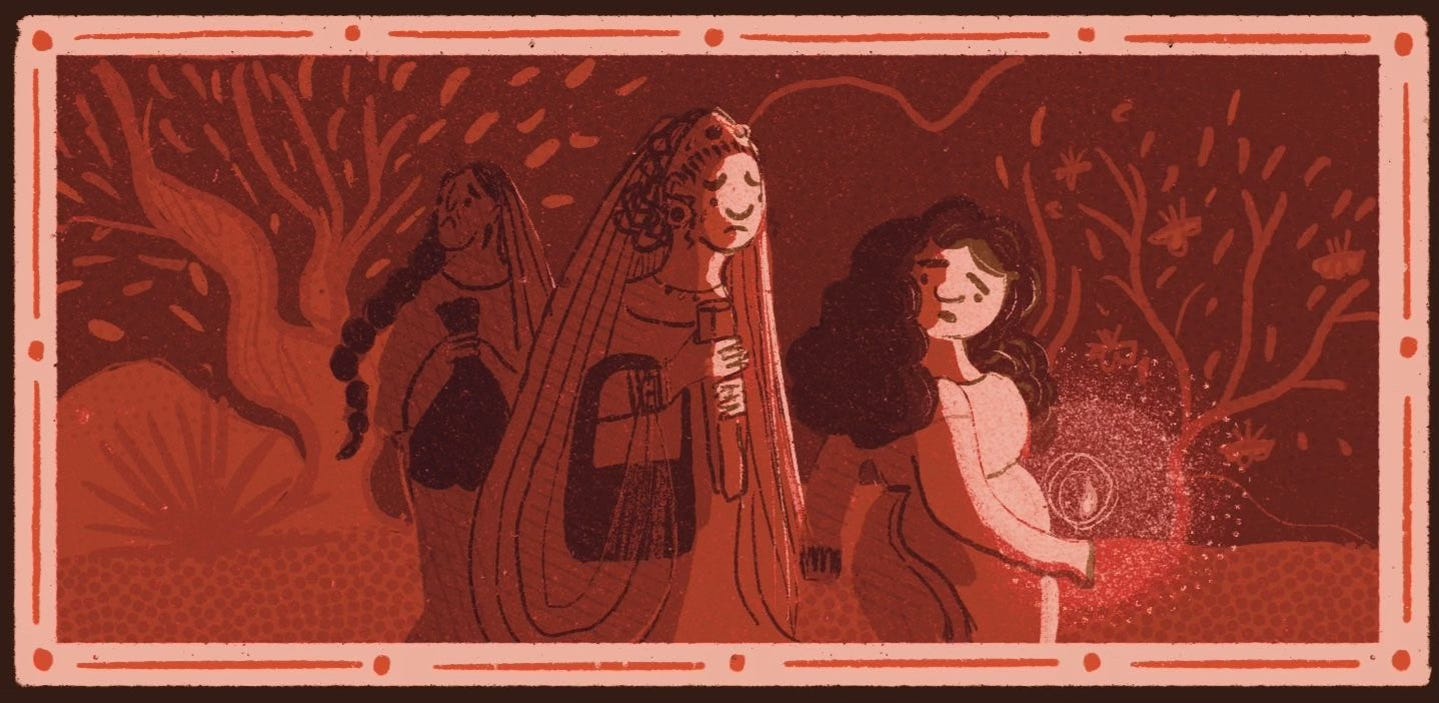

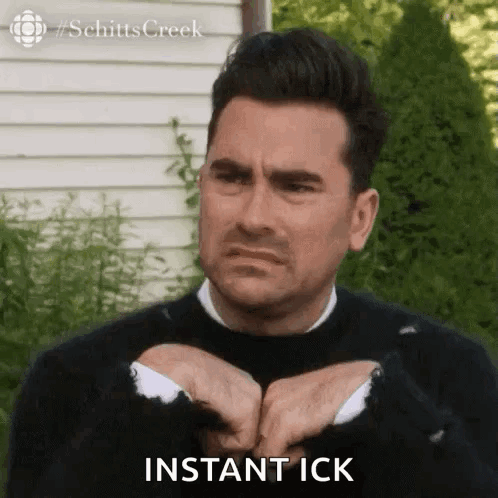
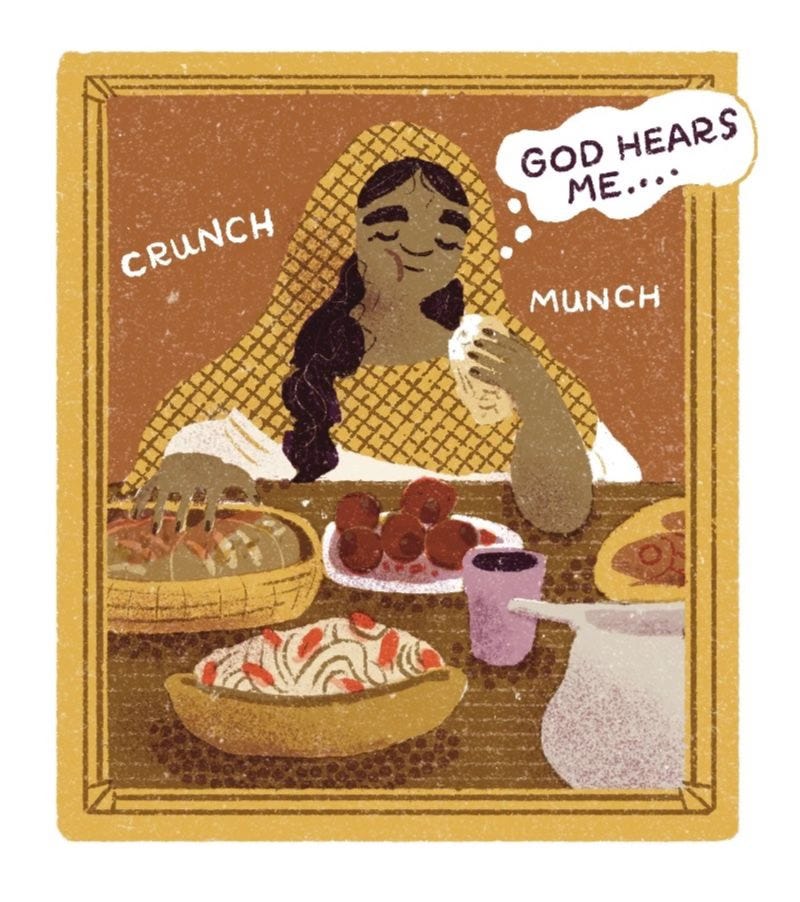

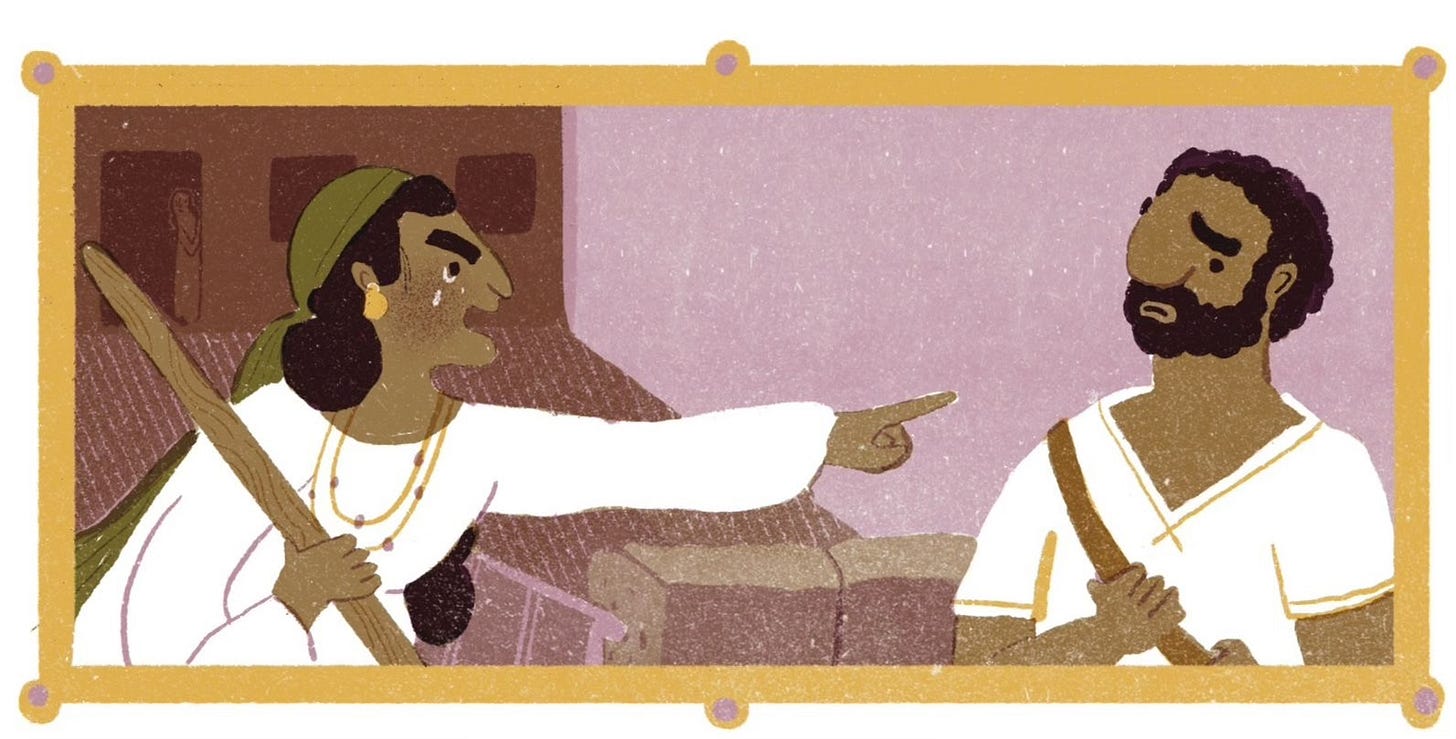

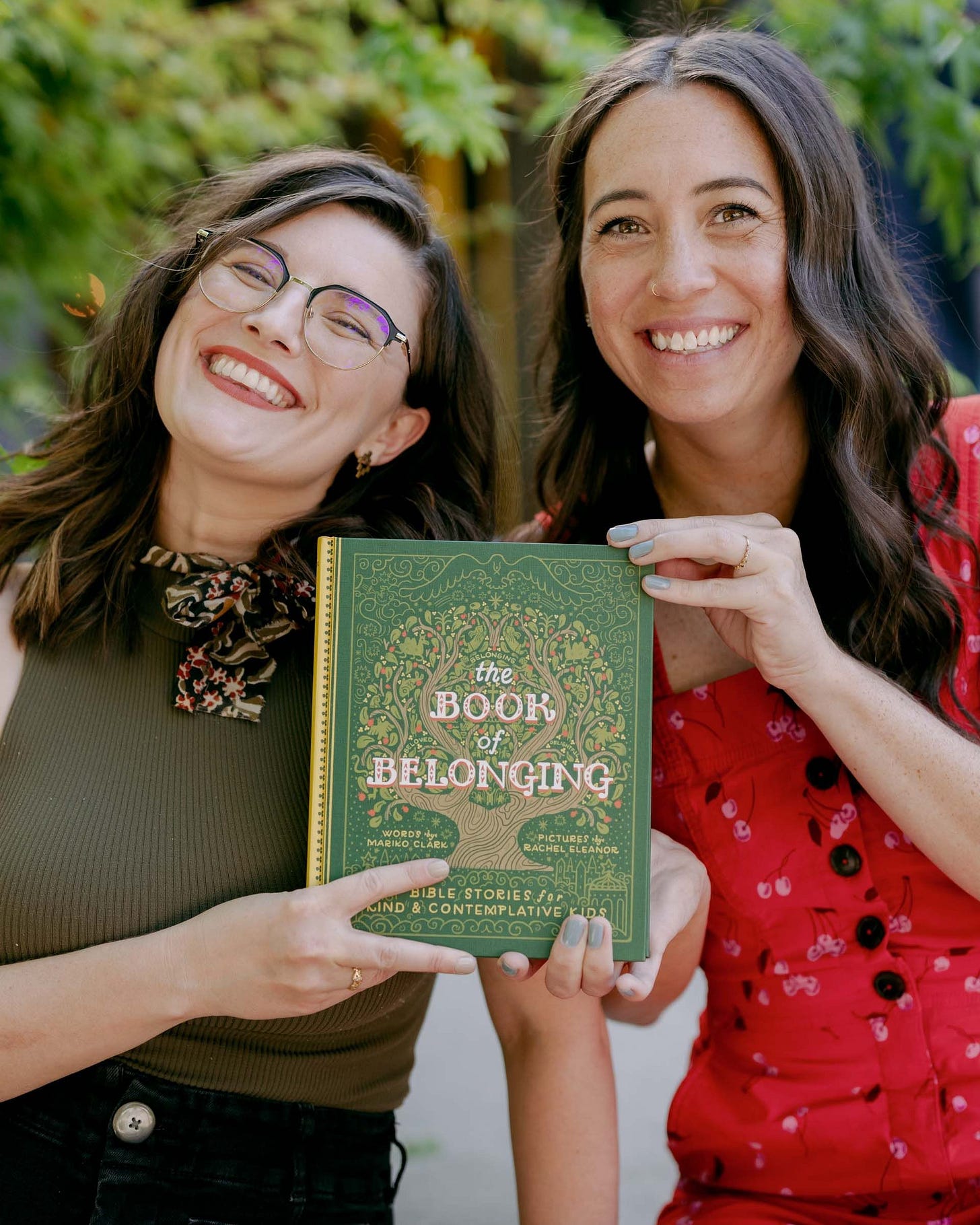
This post touched something deep inside me. This is the "storybook Bible" I wish I would have had when I was raising my young children while simultaneously deconstructing so much of my evangelical faith. As a children's author, a feminist, a spiritual seeker and companion, and one steeped in the stories of the Bible, I, too, believe that Belonging is the Essence of the Christian tradition (which all too often has sadly not been taught or expressed). Thank you, Mariko and Rachel!
My copy came this week and I just finished a quick read through yesterday. It's wonderful! I've passed it on to my daughter. We'll see what she thinks!